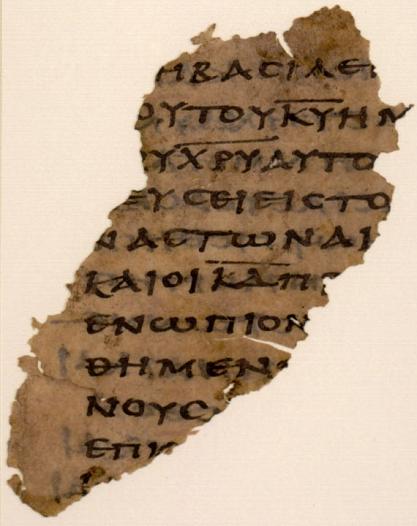| Change to Book/Chapter View |
|
|
|
Translation process is ongoing. For current status see details |
|
|

Uncial 308 Discovered: Oxyrhynchus, Egypt Location: Oxford, England: Sackler Library Contents: Revelation 11:15-18
Revelation 11 15 The seventh angel sounded, and great voices in heaven followed, saying, The kingdom of the world has become the Kingdom of our Lord, and of his Christ. He will reign forever and ever! 16 The twenty-four elders, who sit on their thrones before Gods throne, fell on their faces and worshiped God, 17 saying: We give you thanks, Lord God, the Almighty, the one who is and who was; and because you have taken your great power and reigned. 18 The nations were angry, and your wrath came, as did the time for the dead to be judged, and to give your bondservants and the prophets, their reward, as well as to the saints, and those who fear your name, to the small and the great, and to destroy those who destroy the earth.
|
How to read these pages: The
translation to the left is based on the World English Bible. Words in regular
black font are words in the manuscript matching the Majority Text for that
passage. Words
in italics cannot be seen in the manuscript, since the manuscript is
fragmentary. These words are supplied for readability by the World English
Bible translation. Words
present in the manuscript but with some letters unreadable or missing are in blue
like this: blue. One Greek word often is
translated into multiple English words, and when this occurs, all the English
words are in blue. Words
present in the manuscript but with spelling or trivial word order differences that do not affect the
meaning are in green like this: green. If
the manuscript is different from the Majority Text, words in the Majority
Text that are missing from the text of the manuscript are marked through in red
like this: If the manuscript is different from the Majority Text, words in the manuscript that are not in the Majority Text are underlined in red like this: new words.If the manuscript differs from the Majority Text yet matches another well-known text, this is noted in the footnotes.
|
